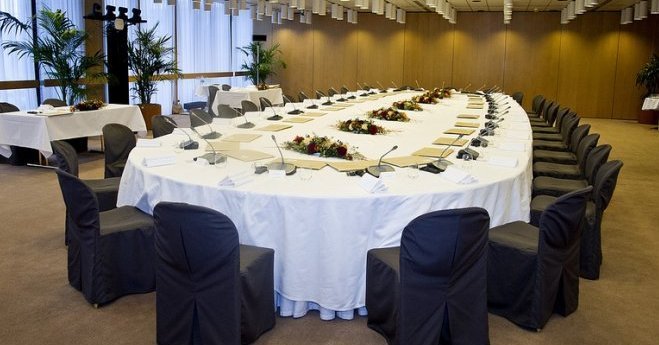To the European Union Heads of State and Government,
After a European Summit that lasted two days and one night, you are back home now, happy that the negotiations are all over, satisfied that you were able to obtain everything that you wanted, and optimistic as your citizens applaud the announcement of the results.
Well I am a young European citizen, and I am not happy, nor satisfied, nor optimistic. Today, for the first time in over 60 years of European integration, you decided to reduce the EU budget in real terms.
That does not mean that you tried to improve spending efficiency and eliminate waste. No. It means that the funds allocated to various EU policies will decrease as the population continues to increase (Croatia will join the EU on July 1st). It means less money for farmers (Common Agricultural Policy), less money for development aid, less money for regional development (Structural Funds and Cohesion Fund), less money for the competition policy (“Europe 2020” objectives), less money for employment (European Social Fund), less money for environmental protection, less money for research and innovation, and in particular, less money for young people (Erasmus and the other programs focused on young people and mobility). In short, it means less money for the 500 million citizens of the European Union.
Pull out your economics textbooks again
You want to decrease budgetary resources at a time when we are stuck in a major economic crisis, when we have just been reassured as to the euro’s future, and when the unemployment rate is skyrocketing all across Europe. Don’t you know that a euro spent by the European Union has a greater impact (due to the leverage effect) than a euro spent in a member state? Have you never heard of economies of scale? If your advisors failed to remind you of these basic principles, then tell them to go back and have another look at their economics textbooks.
Surely, you will say to me: “But my fellow countrymen don’t want to give more money to Brussels.” And why do you suppose that is? It’s because you haven’t done enough to inform your citizens about the EU’s various actions, about how much money actually flows back into your own country, about all of the projects that that money helps fund. It is because you have not taken the initiative to inform your citizens about what you, members of Parliament, civil servants, and Commissioners actually do in Brussels.
Blame it on the system
Of course, you will tell me: But that’s the whole idea of the game. EU resources are negotiated and decided at the intergovernmental level, and each member state defends its own interests in order to represent the public opinion of its citizens. Three-quarters of the EU budget is funded by contributions from member states, so it is only fair that they each have their say. Well, not if they are just going to make decisions like this that will kill the EU in the long term. You are all just using the system as a means of concealing your national egoism.
If you really wanted to save yourself all of this drama that keeps resurfacing every seven years, all you need to do is change the rules of the game, increase the EU’s own resources, and thereby reduce your national contributions. Alas, you are just hiding behind the system, behind the political and administrative meanderings of institutional reform, instead of having a vision, a political vision of what the future of Europe should be like.
And yet you did set objectives for the EU
Don’t you remember? Three years ago, you adopted a strategy for the EU: the Europe 2020 strategy. You set ambitious objectives with conviction:
• “Employment: bring the employment rate to 75% for people aged 20 to 64 • Research, development, and innovation: invest 3% of EU GDP in research and innovation • Energy and climate change: reduce greenhouse-gas emissions by 20% (or even 30%, conditions permitting) compared to 1990; up the share of renewable energy by 20%; increase energy efficiency by 20% • Education: reduce the dropout rate to under 10%; bring the number of people aged 30 to 34 years with higher-education diplomas to over 40% • Poverty and social exclusion: reduce the number of people affected or threatened by poverty and social exclusion by at least 20 million people.” But how are we supposed to achieve all of that without a budget?
We still have national budgets
Of course, these objectives must be implemented in each member state. So, the member states need to be able to maintain their budgets, while at the same time reducing their debt. But given that the budgets of the bigger member states, like France and the UK, represent nearly 40% of GNP, while the EU budget represents less than 1% of European GNP, it seems to me that we have double standards here.
You’re making a laughing stock of the European Union
You are making a complete joke of the European Union through your behavior, your words, and your inability to see beyond your own national elections. It is no wonder that EU citizens are telling us: “The EU can’t possibly work, it’s hard enough for two countries to come to an agreement, let alone 27…”. How can you argue with that? This whole charade that you are putting on, the image that you are projecting of the EU…it is not inspiring to Europeans. It should come as no surprise then that Europeans do not vote for the European elections.
Is that what you really want? To set the record in 2014 for lowest voter participation? With the European Parliament as the only hope left for the EU citizens to reject this decision to reduce the EU budget. We need to reject it so that we can be proud to call ourselves EU citizens, so that we can be satisfied with the EU’s actions, and so that we can remain optimistic for the future. So that we can continue to believe in the European project.


Follow the comments: |
|
